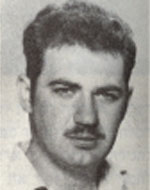Bronstein, Avraham-Yitzhak
Avraham-Itzhak (Adi), son of Frida and Haim, was born on March 8, 1944, in Bessy, Romania, and immigrated with his family in 1961. He studied at the Yiddish-Bessy Jewish school and later completed his studies In a general high school in the city. After the family immigrated to Israel, he paid for a year at a Hebrew ulpan at Kibbutz Ruhama. Adi’s childhood and adolescence passed through the shadow of the Holocaust and the devastation that followed World War II. Although he managed to manage well among the gentiles in his hometown, he felt well the anti-Semitism deeply rooted in Romanian society. He was therefore active in the Jewish underground, whose goal was to immigrate to Israel and study Hebrew. He aspired to be proud of his Jewishness and to walk with his head high, in a country where there would be no alien. Because of this, and because of a request that he applied for an exit visa from Romania, he was not accepted for academic studies, even though he was an excellent student. He did not forget how his people were led to the slaughter like a herd of sheep, and he decided that his fate would not be the same. He swore that he would stand up against murderers with his head high and his weapon in his hand, and indeed the entire course of his life was directed according to this feeling. Adi was tall-backed, broad-shouldered, with a calm voice and a Lev smile. He is endowed with inner peace, stability and mental health combined with abundant kindness and optimism. He was Simcha with his part, courteous and polite, and was able to respect the will of others and help everyone. He was a loyal son and devoted to his parents and came to their aid in the farm work whenever he visited the village of Shammai, where they lived. Before joining the IDF, he worked for a while in the electric company in Ashdod, and was drafted into the IDF in early May 1963 and assigned to the Armored Corps. After completing basic training and after completing his course in the “Sherman” tank course, the Sherman tank was assigned to the NCO, then took part in the course for officers of the Operations Branch and in the Armored Corps course. His commanders noted him as an efficient officer, devoted to his job and his friends. He served for a year as part of the permanent army and was discharged with the rank of lieutenant, in the capacity of commander of the tank division. A year later he returned to serve in the permanent army and was appointed commander of one of the camps in the north, a position he did during the Six-Day War. After the war, he asked to be transferred to a combat unit. He was assigned to a unit in the Jordan Valley and served there until May 1968. After he was released again, he decided to return to the field of study and took part in an electronics technician course on behalf of the Development Authority. After successfully completing his studies, he began working for the Defense Ministry. In 1970 he married a wife and began to integrate his work in electronics studies, which was to be completed at the end of 1973. He invested great efforts in work and studies; His dream was to continue engineering studies and become an electronics engineer – but the Yom Kippur War cut short all his plans. When the war broke out, Adi was not called to report because he was confined to a security establishment. But he did not agree in any way to stand aside at such a time, and on the second day of the war he hurried to join the armored unit that fought in the Golan Heights. On the 12th of Tishrei 5740 (October 12, 1973), he was injured when he broke into Syria at the Jezreel farm. At first he was declared missing and after his body was found he was brought to eternal rest in the Haifa cemetery. He left behind a wife, a father, a mother, and a brother.
